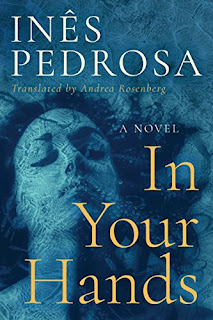Stephanie Jane reviewed In Your Hands by Andrea Rosenberg
A good start, but faded
3 stars
In Your Hands is the history of a Portuguese family through the second half of the twentieth century narrated in turn by three generations of women: Jenny, her adopted daughter Camila, and Camila's daughter Natalia. Through their words we see how Portuguese society an attitudes change from wartime to Salazar's dictatorship to consumerist freedom. It's an ambitious work yet I didn't feel overwhelmed with History because the relationships between the family members and their friends are always centre stage.
By far my favourite section was the first third where Jenny speaks to us of her unusual domestic life with her husband, Antonio, and his long-term male partner, Pedro. The trio hosts evening salons for creative and artistic friends and I got a strong sense of their vivacious life which, despite setbacks obviously, seemed to be generally happy and satisfying. I could imagine the Lisbon of this period quite well especially …
In Your Hands is the history of a Portuguese family through the second half of the twentieth century narrated in turn by three generations of women: Jenny, her adopted daughter Camila, and Camila's daughter Natalia. Through their words we see how Portuguese society an attitudes change from wartime to Salazar's dictatorship to consumerist freedom. It's an ambitious work yet I didn't feel overwhelmed with History because the relationships between the family members and their friends are always centre stage.
By far my favourite section was the first third where Jenny speaks to us of her unusual domestic life with her husband, Antonio, and his long-term male partner, Pedro. The trio hosts evening salons for creative and artistic friends and I got a strong sense of their vivacious life which, despite setbacks obviously, seemed to be generally happy and satisfying. I could imagine the Lisbon of this period quite well especially after having read Estoril and I liked pragmatic Jenny as a person. Camila was more difficult for me to empathise with as she is quite a closed character. Her narrative centres more on the 1970s which is an era I didn't know much about in Portugal so I was interested to learn more. Glimpses of the war in Mozambique and its independence from Portugal are tantalising and I felt I wanted to read more about Camila's time in Africa. Natalia speaks from the 1990s and this final section is a series of letters ostensibly written to Jenny. Natalia uses dense language which often left me quite baffled and unsure as to what Pedrosa was trying to impart through this character. I didn't get such as strong sense of the woman as I did with Jenny and Camila either.
So unfortunately I found my interest in In Your Hands trailing away the longer I read. Had the novel started with Natalia in fact this probably would have been a DNF for me. However I so enjoyed Jenny's narration that I kept hoping that liveliness would reassert itself so I kept on reading. (Spoiler: it doesn't!) In Your Hands isn't an especially long book, but it did drag considerably by the end which was a shame. I am sure other readers will feel differently about each of the women so I'd be interested to hear different perspectives, however I felt that more from Jenny and then closure at the end of Camila's third would have been preferable.

